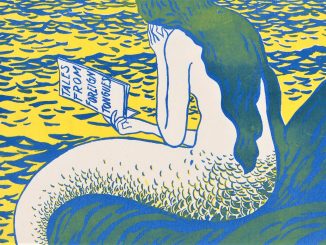![Untitled by Cristina Gallego (@scriles) [Unsplash]](https://www.thenasiona.com/wp-content/uploads/2020/02/Scales-1-1030x438.jpg)
You have strong thighs. Even at your fattest, you had them. You could propel yourself across a swimming pool with surprising speed for someone as unassuming as yourself. In that sense, you peaked at fourteen.
It’s foreign to you now, how much you loved the water. It made you feel lighter, warping your pubescent frame just enough to forget the body you only started to notice a month ago.
Just enough to look like all the other girls submerged to their necks, choking back chlorine against the artificial turquoise of the community center. Just enough that beneath its stagnancy, your thighs mean you are fast and nothing else. Just enough that when swim practice is over, you linger behind under the guise of a cool-down so you won’t have to leave the comfort of the water’s distortions and face your fairy-like and lithe teammates above ground. Your mom will plead with you to finish up. It’s getting late, she is tired, and the pool is closing soon. When you finally make it to the locker room, you never shower. You live for this sterile clean, a chemical dryness exacerbating eczema patches even on your eyelids already swollen from how often you open your naked eyes underwater to bask in the blur yourself.
Refraction occurs when a light wave passes through one medium to another, altering the angle from the normal just enough to cause the wave’s path to distort. It’s basic physics, which means it’s a given. You can’t argue with the natural world that way, you can’t accost the individual for their strangeness in shape or their largeness as perceived underwater from above. Beneath the surface, there’s a better gravity – or rather, the same gravity only offset by buoyancy. More physics. Until you pull yourself up, with your strong thighs and slightly-less-strong arms, columnar pressure caused by submersion molds you into the most perfect version of yourself, flattens you out in all the right places and smooths over leg hair you won’t acknowledge for another year. Until you pull yourself up, you’re pretty, a foreign thought for you at thirteen that’s maybe still foreign today. Maybe you’re not really fat. What else is puberty if not weight gain in unfortunate places and excretions of fluid and tissue much denser than chlorinated water? But you will never have to worry about swim practice on your period: you burn that bridge before you get to it.
Julia tries to be your friend outside of practice. Julia is a better swimmer than you. She goes to a private school that has its own team but she still swims for yours. Julia’s fit and angular. She dresses cool and in retrospect you might have been attracted to her, but that’s neither here nor there. In a couple months, she won’t be better than you because she’ll be admitted to a residential program for laxative abuse. You’re not sure what this means yet, but years later when you’re crouched over the toilet during ninth-grade algebra, you’ll want to ask her how she managed not to shit herself in the water.
Spencer is not your friend outside of practice, and he’s certainly not your friend at meets when he goes out of his way to wave his first-place medals in your fat face. One day in line for free-diving he asks why you don’t look like Julia and that’s just enough to trigger an instinct you didn’t know you had. You twist his right nipple and he yelps like a piglet. You’re a good kid and he’s not, so no one believes him when he tells the coach what you did. You did do it, though, and you hear later that his dad does worse.
Your lingering after practice shortens the following season. You’ve lost some weight. You’re the only girl left on the team, and when Dominick says that means you’re not like other girls, you feel unearned exceptionalism. That’s never a compliment but you learn too late. Still, your thighs are strong, just enough to go out with a bang before you pull yourself up onto the ladder leading from the deep end and a teammate’s mom asks if what’s on your knees is contagious. You look at the eczema patches that are now more widespread than what a doctor will later deem “unaffected tissue.” You are, again, embarrassed.
AUTHOR

Rachel Stempel is an MFA candidate and adjunct instructor at Adelphi University. Originally from the Bronx, she currently larps as a Long Island townie.
Instagram: @ollpheist69


